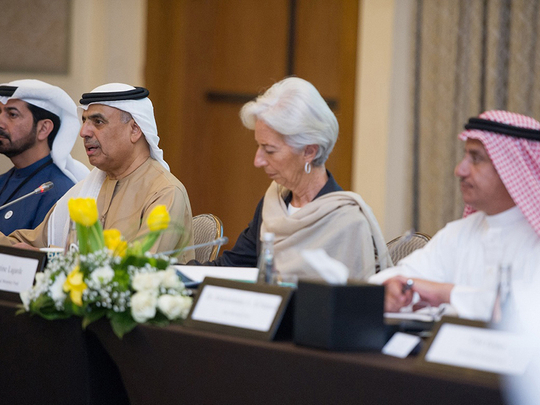
Dubai
Despite a pickup in economic growth rates around the world, the Arab world is not seeing a fair share of this increase, with growth rates not nearly enough to provide enough jobs for young people.
According to Christine Lagarde, managing director of the International Monetary Fund (IMF), there are “big challenges” all around in Arab countries, with stability ultimately at stake.
“Clearly, the global economic recovery has strengthened, and growth [forecast] at the pace of 3.9 per cent this year and next year is clearly on a much better footing, with about 75 per cent of the world economies participating in this movement,” Lagarde said in a speech in Dubai on Saturday. “Only 75 per cent, though, which means that the tide is not rising all boats, and certainly, the tide is not rising this region enough.”
For oil exporters, despite the rebound in oil prices, there is still “significant pressure” on fiscal balances, and thus, a need for a different economic model and more diversification, Lagarde said.
For oil importers in the Arab world, growth rates are “nowhere near” what is needed to provide enough jobs for new people entering the labour market.
“[Youth employment in the Arab world] is the highest in the world, with an average of 25 per cent, exceeding 30 per cent in nine out of the 21 Arab countries. In addition, about 27 million young people will be joining the job market in the next five years, anxious to be included,” Lagarde said.
She added, “But so far, their aspirations are unfilled, and their understandable frustration is compounded by perceived unfairness.”
According to the Arab Monetary Fund, Arab economies saw an average growth rate of a 1.9 per cent in 2017, with the figure expected to rise to 3 per cent in 2018. However, economies in the Arab world would need to see growth at a 5-6 per cent rate for labour markets to be able to absorb new entries.
Discussing economic challenges in Arab countries, the managing director pointed to conflicts, terrorism, and heightened security risks. She added that public debt has been on the rise, exceeding 50 per cent of gross domestic product (GDP) in some countries.
Lagarde said that unless fiscal policy is on a sustainable path, such an increase in debt will weigh on young people, and growth won’t be inclusive.
Speaking at the Arab Fiscal Forum in Dubai, she said that the UAE’s move to introduce excise tax and Value-Added Tax was “an important step towards diversifying revenue.” Even with both taxes, there is scope to do more, with domestic revenues averaging only nearly 10 per cent of GDP.
“We believe this process needs to be done with equity and fairness in mind — both of which are conditions for the acceptability of taxation.
Lagarde also discussed the continued use of energy subsidies in some countries in the Arab world, saying “there is no excuse” for it.
“Firstly, they (energy subsidies) are extremely costly, averaging around 4.5 per cent of GDP among oil exports, and 3 per cent of GDP among oil importers. Secondly, they lack transparency; subsidies are often implicit and off-budget.
Third, they are vastly inequitable. Perhaps worst of all, they are subsidising environmental harm at a time when we need to go in the opposite direction to protect our resources, people’s lives, health, and future,” she said.












